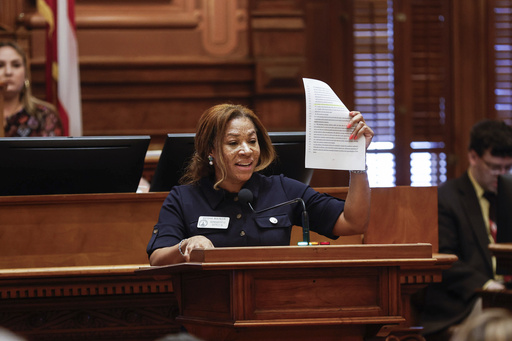
ATLANTA — In a significant development for Georgia’s political landscape, Democrats have succeeded in unseating two Republican incumbents in the state House. However, the anticipated reduction of the Republican majority was not as pronounced as Democrats might have hoped.
As of Wednesday, with several races yet to be determined, Republicans maintained control of 98 out of the 180 House seats, while Democrats secured 78. Should the frontrunners in the outstanding races emerge victorious, the Republicans would hold 100 seats, elevating the Democrats to 80. Notably, two of the contests are too close to call, leading to a potential recount as margins fall below 100 votes.
Initially, Republicans were ahead 102-78 at the start of the voting. GOP incumbents Mesha Mainor and Ken Vance were defeated by their Democratic challengers, while attempts to unseat three other Republican incumbents in the northern suburbs of Atlanta did not bear fruit for Democrats. This outcome minimizes concerns for Republicans, who will avoid the complications associated with a significantly reduced majority. Additionally, the efforts of Governor Brian Kemp’s political organization, which invested $2 million to support Republican House candidates, appear to have paid off.
This election marked the first following a court-mandated redrawing of district lines intended to enhance Black-majority districts. Given that Black voters traditionally favor Democrats, this reshaping created opportunities for Democratic representation in the House. However, Republican mapmakers also reconfigured the state’s 14 Congressional Districts and 56 Senate districts, resulting in limited substantial competition among parties for these positions. The partisan distribution in the state Senate remained unchanged, with 33 Republicans and 23 Democrats retaining their seats after all incumbents prevailed.
“Senate Republicans finished the drill tonight,” remarked Senate President Pro Tem John Kennedy, a Republican from Macon.
Democratic leaders acknowledged the challenges of achieving a majority in the lower chamber of the General Assembly this cycle. However, they aimed to demonstrate progress toward that goal after a strong Republican hold in 2022 when Kemp was re-elected.
Democratic campaigns revolved around issues such as repealing Georgia’s abortion restrictions, advocating for stronger gun regulations, and expanding Medicaid coverage for low-income adults. In contrast, Republicans emphasized their commitment to low taxes, law enforcement, and educational vouchers.
“From historic tax cuts and educational investments to enhancing public safety, increasing healthcare access, and creating more opportunities, Georgia House Republicans continue to yield results, which tonight’s outcomes reflect,” stated House Speaker Jon Burns, a Republican from Newington. This result bolstered his case for continuing leadership in the House. “We will keep striving to expand the Republican tent and address the essential issues affecting families across Georgia.”
Ken Vance was notably affected by redistricting; his House district in Milledgeville was restructured to become majority Black, leading to his defeat at the hands of Democrat Floyd Griffin, a former state senator and mayor.
Meanwhile, Mainor, the other defeated Republican incumbent, had made a party switch from Democrat to Republican amidst disagreements over school vouchers and Fulton County District Attorney Fani Willis. She faced significant challenges in a central Atlanta district, ultimately losing decisively to Democrat Bryce Berry.
In another closely contested race as a result of redistricting, Democrat Farooq Mughal of Dacula was trailing Republican Sandy Donatucci of Buford by a narrow margin of fewer than 100 votes. The outcome in this race remains undetermined. Conversely, Republicans were unsuccessful in their aim to unseat Democratic state Rep. Jasmine Clark of Lilburn.
Democrats had targeted several Republican incumbents, including Scott Hilton from Peachtree Corners, Matt Reeves from Duluth, and Deborah Silcox from Sandy Springs, framing their strategies around abortion and gun policy. However, Hilton and Reeves managed to secure victories, while Silcox maintained a lead over her Democratic challenger Susie Greenberg in an uncalled race.
Democrats faced strong challenges even in districts outside the Atlanta metro area, as Republicans saw increased support in Georgia’s smaller cities and rural communities. In a similarly tight contest, Rep. Mack Jackson of Sandersville found himself only 100 votes ahead of Republican Tracy Wheeler from Sparta. Democrat Tangie Herring from Macon also held a slight lead over Republican Noah Harbuck in a newly created middle Georgia district that lacked an incumbent, although that race too remained uncalled.
Both Herring and Jackson participated in contests situated in districts with a narrow Black majority, where increased GOP votes posed challenges for Democrats. Longtime incumbent Patty Stinson of Butler also faced a tight race in a rural Black majority district but managed to secure a clear victory.
“The surge of rural Georgia is clearly driving Republican support in the state,” Stinson remarked. “Democrats must shift more focus to rural Georgia.”
